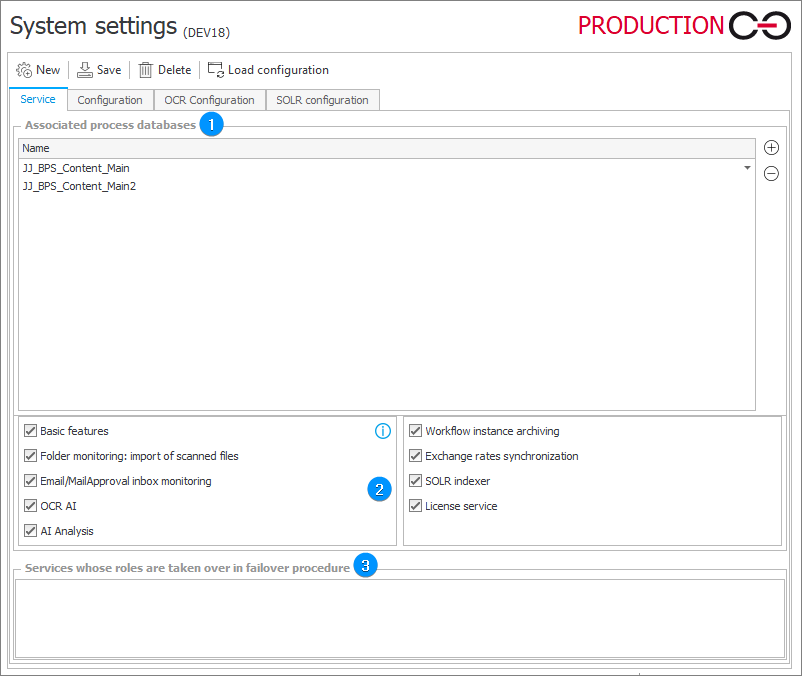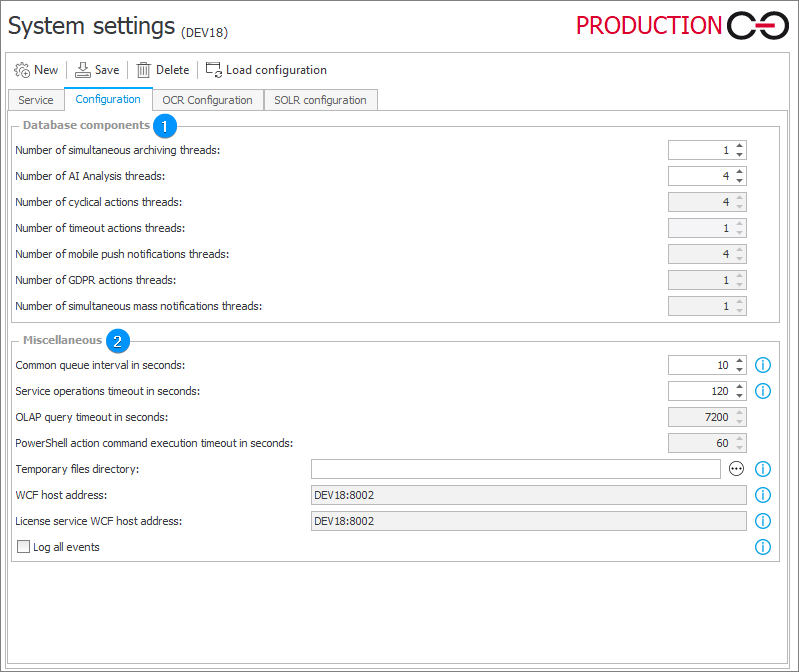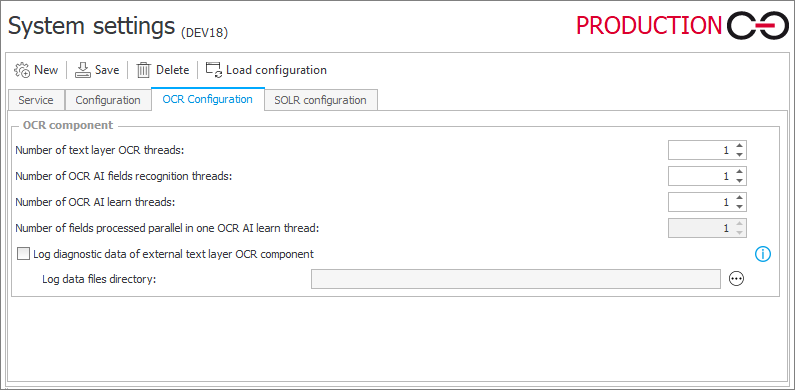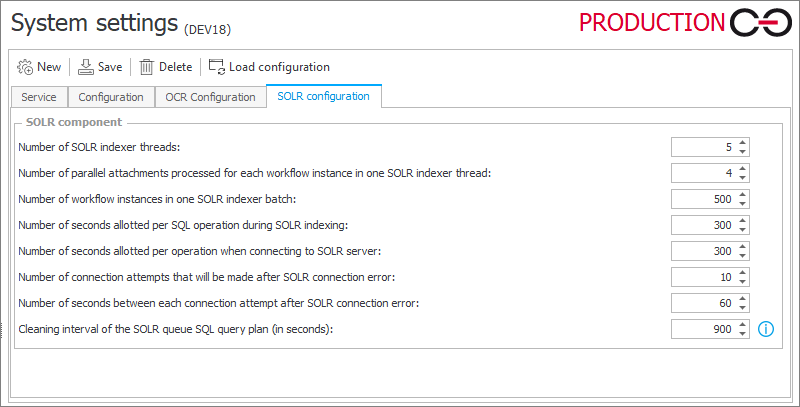Services
List of services available in the environment.
The activity of individual service modules and the address of the associated WEBCON BPS Portal can be configured from Designer Studio. The configuration is only valid for the service installed on the same computer where Designer Studio is running.
The configuration window for each service is divided into four tabs: Service, Configuration, OCR configuration, SOLR configuration.
Service
The tab allows you to define the process databases associated with the service and the roles the service will play in the system, including during the failover procedure.

1. Associated process databases
Databases that handle processes in WEBCON BPS and store data from WEBCON BPS Portal.
2. Service roles
This section allows you to configure the roles performed by the service.
Basic features:
- Synchronization of the organizational structure taken from Active Directory / Azure Active Directory / LDAP,
- Additional synchronization of individual users,
- Running organizational structure synchronization according to a schedule,
- Sending e-mails,
- Cyclical actions control,
- Timeout actions control,
- Updating OLAP analyses,
- Setting substitutions for active tasks,
- Sending mass notifications,
- Support for mobile push notifications,
- Deleting personal data (GDPR),
- Updating active task counters,
- Importing process and application configurations,
- Cloning process and workflow configurations in Designer Studio,
- Administrative deletion of WorkFlow instances with related data (tasks, attachments),
- User photo synchronization,
- Running user photo synchronization according to a schedule,
- Executing SharePoint operations triggered from actions and data sources,
- Executing PowerShell code called from PowerShell actions,
- Printing barcode using a printer driver,
- Reading barcodes from an attachment,
- Adding a barcode to an attachment,
- Providing data for reports in Designer Studio (service activities, modules running, attachment processing),
- Providing domain and organizational unit data for user synchronization configuration in Designer Studio,
- Performing AI analyses.
Folder monitoring: import of scanned files
Activates the service of matching scans with documents registered in the system and starts new workflow instances with attachments
Email/MailApproval inbox monitoring
Activates the service of scanning mailboxes and starting new workflow instances based on attachments, and activates the MailApproval service.
OCR AI
OCR-related actions (Text layer, Recognition, Teaching).
AI Analysis
AI Analysis actions.
For more information see the article Analysis of anomalies in processes on our technical blog.
Workflow instance archiving
Moving workflow instances to the archive database and compressing instances into .zip files.
Exchange rates synchronization
Activates the service of loading exchange rates.
SOLR indexer
Enables SOLR indexation.
License service
Activates the license service.
After each change of the service roles, make sure you have saved the changes and reload (or restart) the service configuration.
3. Services whose roles are taken over in failover procedure
The services displayed here are connected to the current service via the failover mechanism. This mechanism allows roles to be taken over by the current service when an indicated service becomes inactive (either by being manually shut down or by failure).
Extensive information about WEBCON service roles can be found in THIS ARTICLE on our technical blog.
Configuration
The tab allows you to change the settings of database components, as well as the timing parameters of executed queries and operations.

1. Database components
This section allows you to set the number of threads for each operation performed by the service on the system. (Some settings can only be changed using the administrative tools in the installer):
- Number of simultaneous archiving threads,
- Number of AI Analysis threads,
- Number of cyclical actions threads,
- Number of timeout actions threads,
- Number of mobile push notifications threads,
- Number of GDPR actions threads,
- Number of simultaneous mass notifications threads.
The number of threads should be adjusted to individual preferences or capabilities of the machine processing the instances.
When using dedicated machines for a certain type of processing, optimal use of a machine’s processor can be achieved by setting the number of concurrent threads to be 1 higher than the number of available processor cores.
2. Miscellaneous
Additional parameter settings relating to the operation of the service.
Common queue interval in seconds
The longest time after which elements in the queue will be processed (if no other elements are processed in the queue):
- Text layer,
- OCR AI,
- OCR AI Learn,
- Recursive actions (elements are processed on schedule),
- Timeout actions (elements are processed on schedule),
- Archiving,
- Push notifications,
- Users synchronization,
- GDPR actions,
- SOLR indexer,
- AI analysis.
Service operations timeout in seconds
You can change the default set of the Timeout for cyclical actions.
The service logs completed tasks or tasks execution errors by default. When you turn on the logging of all events, the service will also log the attempts to complete tasks (e.g. attempts to match files in spite of empty file directories).
OLAP query / PowerShell action command execution timeout in seconds
Here you can specify in seconds how much time the system will have to execute the OLAP query and the PowerShell action command.
Temporary files directory
The field allows you to specify a directory where the temporary files of various service modules will be stored.
The following modules use the directory:
- HotMailBoxes,
- Asynchronous OCR,
- Workflow instance archiving.
FlexiCapture projects will also be stored in the directory. If the field is left blank, the temporary files will be stored in the Windows user’s temporary file directory.
(License service) WCF host address
These parameters can only be changed using the installer's administration tools.
Log all events
Allows you to log additional data from cyclical actions, timeout actions, exchange rates processing, and add HotFolder and HotMailBox attachment to a workflow instance.
OCR Configuration
Configuration of the OCR components for which the service is responsible.

Available settings of the OCR components:
- Number of text layer OCR threads,
- Number of OCR AI fields recognition threads,
- Number of OCR AI learn threads,
- Number of fields processed parallel in one OCR AI learn thread,
The number of threads should be adjusted to individual preferences or capabilities of the machine processing the instances.
When using dedicated machines for a certain type of processing, optimal use of a machine’s processor can be achieved by setting the number of concurrent threads to be 1 higher than the number of available processor cores.
Log diagnostic data of external text layer OCR AI learn thread
This option is used to log diagnostic data from the external ABBYY FineReader component. Enabling this option will impact performance. Change of this value requires the service configuration to be reloaded.
Log data files directory
Allows you to specify where on the disk the diagnostic data from the external ABBYY FineReader component is located. It is important to monitor the location of this log to ensure that there is enough space.
SOLR Configuration
Configuration of the SOLR components for which the service is responsible.

Available settings of the SOLR components:
- Number of SOLR indexer threads,
- Number of parallel attachments processed for each workflow instance in one SOLR indexer thread,
- Number of workflow instances in one SOLR indexer batch,
- Number of seconds allotted per SQL operation during SOLR indexing,
- Number of seconds allotted per operation when connecting to SOLR server,
- Number of connection attempts that will be made after SOLR connection error,
- Number of seconds between each connection attempt after SOLR connection error,
Cleaning interval of the SOLR queue SQL query plan
Specifies an interval (in seconds) for cleaning the query plan that loads data from the SOLR indexing queue. Cleaning the query plan allows queries to be executed much faster when there is a lot of variance between entries in the indexing queue.
Workflow Service
Workflow Service is a Windows service fulfilling the following functions:
- Printing barcodes,
- Pairing scans with documents registered in the system,
- Running timeout actions,
- Running substitutions,
- Running cyclical actions,
- Downloading currency rates from the National Bank of Poland website,
- Adding text layer on scanned documents,
- Starting new workflows for email attachments.
These functionalities can be executed by one service or be divided among several services running on different machines.
If the Service is installed on the same machine on which Designer Studio runs, it is possible to perform module configuration through it.
The activity of individual modules (except for barcode printing, which is turned on by default) can also be set directly in the config.xml file that is in the same location as the executable service file.
Apart from the activity of individual service modules you should set the address of the website on which WEBCON Business Process Suite has been installed in the configuration file. On the basis of that address a database is specified from which the configuration of individual service functionalities will be downloaded.